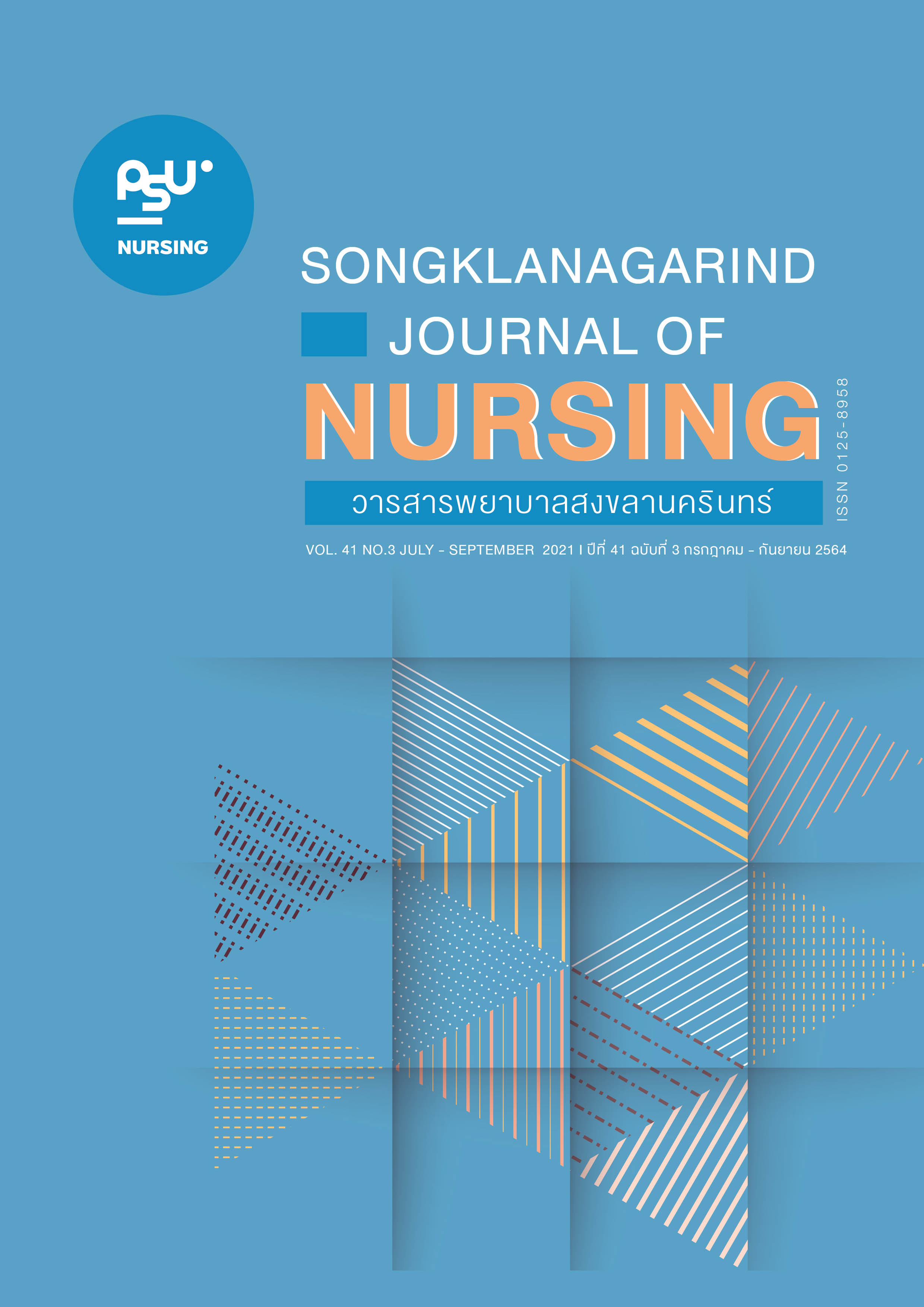Associated Severity of Common Clinical Symptoms with Anxiety and Depression among Patients with Advanced Cancer
Main Article Content
Abstract
Objective: This descriptive cross-sectional study aimed to examine anxiety, depression and symptom severity of patients with advanced cancer. Methods: Sample were patients with advanced cancer. A purposive sample of 428 patients was recruited for this study. Data were collected by using Patient Information Sheet and Edmonton Symptom Assessment Scale (ESAS). Data were analyzed by using descriptive statistics and Spearman Rank Correlation. Results: The findings revealed that the overall average scores of anxiety and depression were at a low levels M = 3.41 (SD = 2.36) and M = 3.64 (SD = 2.25), respectively It was found that 41.58% and 36.22% of patients perceived anxiety and depression at moderate-to-high levels which required transferring to the palliative care team. Top three reported symptoms severity were poor appetite, not getting well and fatigue. It was found that severity of symptoms were significantly positive correlated with
anxiety and depression (p < .05), except nausea. Depression of the groups of patients between those received the palliative treatment (chemotherapy and radiotherapy) and the symptomatic treatment (general standard); as well as the In-patient the between and the outpatient department patients were not statistically different. For anxiety, significant difference between the palliative and symptomatic treatment groups was found. However, there was non-significant difference between the In-Patient Department (IPD) and Out-Patient Department (OPD) groups. Discussion: These findings underscore the need for routine screening of symptom were severity because these symptoms were associated with anxiety and depression in palliative care setting.
Article Details
References
Chula Cancer. Division of Therapeutic Radiology and Oncology, King Chulalongkorn Memorial Hospital. Advanced cancer [internet]. 2016 [cited 2020 Sep 9] Available from: http://www.chulacancer.net/patient-list-page.php?id=238
American Cancer Society. Understanding advanced cancer, metastatic cancer, and bone metastasis [internet]. 2020 [cited 2020 Sep 5]. Available from: https://www.cancer.org/treatment/understanding-your-diagnosis/advanced-cancer/what-is.html
Wilson KG, Chochinov HM, Skirko MG, et.al. Depression and anxiety disorders in palliative cancer care. J Pain
Symptom Manage. 2007; 33(2): 118-29. doi: https://doi.org/10.1016/j-jpainsymman.2006.07.016.
Yang YL, Liu L, Wang XX, et al. Prevalence and associated positive psychological variables of depression
and anxiety among Chinese cervical cancer patients: Crosssectional study. PLOSONE. 2014; 9(4): e94804. doi: https://doiorg/10/1371/journal.pone.0094804.
Delgado-Guay M, Parsons HA, Li Z, et al. Symptom distress in advanced cancer patients with anxiety and
depression in the palliative care setting. Support Care Cancer. 2009; 17(5): 573-9. doi: 10.1007/s00520-008-0529-7.
Mystakidou K, Tsilika E, Parpa E, et al. Assessment of anxiety and depression in advanced Cancer patients and
their relationship with quality of life. Qual Life Res. 2005; 14(8): 1825-33. doi: 10.1007/s11136-005-4324-3.
Uitterhoeve RJ, Vernooy M, Litjen M, et al. Psychosocial intervention for patients with advanced cancer-a systematic review of the literature. Br J Cancer. 2004; 91(6): 1050-62. doi: 10.1038/sj.bjc.6602103.
Budlak S, Namjuntra R, Binhosen V. Effectiveness of the nursing practice guidelines on the anxiety of patients with advanced liver cancer. Thai Red Cross Nursing Journal. 2017; 10(2): 74-86. Thai.
Chinda M, Jaturapatporn D, Kirshen AJ, et al. Reliability and validity of a Thai version of the Edmonton Symptom Assession Scale ( ESAS-Thai). J Pain Symptom Manage. 2011; 42(6): 954-60. doi: 10.1016/j.jpainsymman.2011.02.020.
Buzgova R, Jarosova D, Hajnova E. Assessing anxiety and depression with respect to the quality of life in cancer in patients receiving palliative care. Eur J Oncol Nurs. 2015; 19(6): 667-72. doi: 10.1016/j.ejon.2015.04.006.
Delgado-Guay M, Yennurajalingam S, Parsons H, et al. Association between self-reported sleep disturbance and other symptoms in patients with advanced cancer. J Pain Symptom Manage. 2011; 41(5): 819-27. doi: 10.1016/j.jpainsymman.2010.07.015.
Kim SJ, Rha SY, Song SK, et al. Prevalence and associated factors of psychological distress among Korean cancer patients. Gen Hosp Psychiatry. 2011; 33(3): 246-52. doi: 10.1016/j.genhosppsych.2011.02.008.
Lie HC, Hjermstad MJ, Fayers P, et al. Depression in advanced cancer-assessmesnt challenges and associations with disease load. J. Affect. Disord. 2015; 173: 176-184. doi: 10.1016/j.jad.2014.11.006.
Salvo N, Zeng L, Zhang L, et al. Frequency of reporting and predictive factors for anxiety and depression in patients with advanced cancer. Clin. Oncol. 2012; 24(2): 139-48. doi: https://doi.org/10.1016/j.clon.2011.05.003.
Lemeshow S, Hosmer DW, Klar J, et al. Adequacy of sample size in health studies. New York: John Wiley &
Sons; 1990.
Vignaroli E, Pace EA, Willey J, et al. The Edmonton Symptom Assession System as a screening tool for depression and anxiety. J Palliat Med. 2006; 9(2): 296-303. doi: 10.1089/jpm.2006.9.296.
Hinkle DE, Wiersma W, Jurs SG. Applied statistics for the behavioral sciences. 5 th ed. Massachusetts: Houghton Mifflin; 2003.
Ball H, Moore S, Leary A. A systematic literature review comparing the psychological care needs of patients with mesothelioma and advanced lung cancer Eur J Oncol Nurs. 2016; 25: 62-7. doi: 10.1016/j.ejon.2016.09.007.
Cheng KKF, Devi RD, Wong WH, et al. Perceived symptoms and the supportive care needs of breast cancer
survivors six months to five years post-treatment period. Eur J Oncol Nurs. 2014; 18(1): 3-9. doi: 10.1016/j.ejon.2013.10.005.
Lerdpanich P, Namvongprom A, Pakdevong N. Symptom experiences and quality of life of patients with advanced cancer receiving chemotherapy. APHEIT Journal. 2017; 6(1): 45-55. Thai.
Tantong S, Namvongprom A, Pakdevong N. Symptoms experience and quality of life in patients with advanced cancer receiving radiation therapy. APHEIT Journal. 2016; 5(1): 40-7. Thai.


